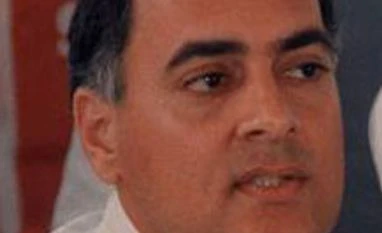The Tamil Nadu Government has decided to release all the seven members, who are convicted in the Rajiv Gandhi assassination case.This follows the directive of the Supreme Court on tuesday commuting the death sentence of the three assassins of Rajiv Gandhi to life imprisonment, holding that the 11-year long delay in deciding their mercy petition had a dehumanising effect on them. Tamil Nadu Chief Minister J Jayalalithaa said that the decision was taken at the State cabinet meeting and asked the Centre to reply within three days on the issue."If the centre does not respond in three days, the State will use its power Under Section 432 to release all the seven convicts," said Jayalalithaa.
It may be noted, all the Political Parties in the State have been campaigning for the release of the convicted
Here are the 5 top things one should know about the Rajiv Gandhi assassination case
More From This Section
1) Murder of Rajiv Gandhi
Former Prime Minister Rajiv Gandhi and 14 others were killed on May 21, 1991 when a suicide bomber blew herself up after touching his feet at an election campaign rally (prior to the parliamentary elections), in Sriperumbudur, near Chennai.
The 14 victims included a photographer who had captured the assassin and Gandhi on film.
The assassination was carried out by Thenmozhi Rajaratnam alias Dhanu, who was associated with the Liberation Tigers of Tamil Eelam (LTTE), a separatist organisation from Sri Lanka.The assassination was seen as a retaliation for Gandhi having sent Indian Peace Keeping Force (IPKF) to Sri Lanka in 1987.
2) CBI takes charge
On May 22, 1991, the case was handed over to The Central Bureau of Investigation (CBI) and a Special Investigation Team (SIT) headed by D R Karthikeyan was formed to probe the case and the probe confirmed the role of LTTE in the assassination, which was upheld by the Supreme Court of India.
It may be noted the State was then under President's rule after DMK Government was dismissed for its alleged role in the assassination.
An interim report of Justice Milap Chand Jain, which was looking into the conspiracy angle to the assassination, also stated that the then ruling DMK Government in Tamil Nadu, colluded with the LTTE. The report concluded that DMK provided sanctuary to the LTTE, which made it easy for the rebels to assassinate Rajiv Gandhi.
SIT charge sheeted 41 accused, including 12 dead and three absconding, before a TADA trial court.
3) Dates to recall in Courts
January 1998: A TADA court awarded death sentence to all 26 accused, against which the accused went to an appeal in May 1999 in the Supreme Court. The apex court upheld death of Murugan, Santhan, Peraivala and Nalini, gave life term for three and freed 19 others in October same year.
October 17,1999: The four convicts submitted mercy petitions to the Governor Tamil Nadu, however it was rejected in the same month.
November 25,1999: The Madras High Court set aside the Governor's order and asked to pass a fresh order after discussing with the State Cabinet.
April 19,2000: The then ruling DMK Government held a cabinet meeting, which was headed by DMK Supermo M Karunandhi, and advised the Governor to commute Nalini's sentence and uphold the death sentence of the other three convicts.
April 2000: Tamil Nadu Governor accepts the State cabinet's advise and confirms maximum punishment to Peraivalan, Santhan, and Murugan. In the same month, the State Government forwards mercy petition of the three to the President of India.
August 12,2011: The President rejects the clemency petitions and in the same month all three moved the Madras High Court and challenged the rejection.
August 30,2011: Tamil Nadu assembly passed a resolution seeking commutation of death sentence
August 31, 2011: The Madras High Court stayed hanging by eight weeks after convicts challenge rejection of mercy petitions.
September 15,2011: The Supreme Court issues notice to Centre on a plea to shift convicts petitions outside Tamil Nadu.
May 2012: The Supreme Court transfers to itself the petitions from the Madras High Court
February 18,2014: The Supreme Court commutes death sentence to life term, cities 11-year delay from 2000-2011.
February 19,2014: Tamil Nadu Government decides to release all the seven convicts in the Rajiv Gandhi assassination case and seeks Centre's reply in three days failing which it will use its power Under Section 432 to release all the seven convicts, said Tamil Nadu Chief Minister J Jayalalithaa.
4) Other important dates
In mid-1991,a three-month police hunt for Sivarasan, nicknamed One-Eyed Jack, who is believed to have planned and executed the assassination of Rajiv Gandhi ended abruptly when he and six confederates committed suicide as the police closed in on their hideout in the southern city of Bangalore
2000: Rajiv Gandhi's widow and Congress President Sonia Gandhi files a petition for clemency for the sake of Nalini's daughter in 2000. The petition wanted the death sentence to be commuted to life imprisonment
June 2006: Sri Lanka's Tamil Tiger rebels have expressed "regret" over the assassination of Rajiv Gandhi 15 years ago and called it as was a "monumental tragedy".
2008: Gandhi's daughter Priyanka Gandhi met Nalini in jail and later said in an interview that she had forgiven her father's killer
August 3, 2008: Nalini Sriharan, serving a life sentence for her involvement in the assassination of Rajiv Gandhi, says she "regrets" the killing of the former Prime Minister and claims that the real conspirators have not been booked yet.
5) Reasons behind Tamil Nadu Government's Decision
The State government has claimed that the decision to release the convicts was taken on humanitarian grounds after considering the fact that they had already spent 23 years in the prison. But political observers argue that this could also be a move to appease the sentiments of a section of voters who are sympathetic to the tamil cause.
)